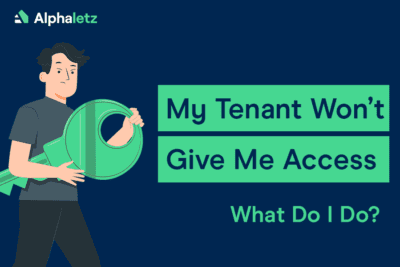We thank Tessa Shepperson for contributing to the Alphaletz blog for our readers.
Tessa is the Founder of Landlord Law and is a solicitor specialising in help for landlords. You can view Tessa’s website by clicking here.
Without further ado, let’s get stuck into the blog!
Contents...
What is a Fixed Term Tenancy
When you grant a tenancy to a tenant, you grant the property for a period of time. This will normally be for six months or a year, but can actually be for any period. So if you want, you can grant a fixed term for a week, three months, two years or five years.
This period of time is known as the fixed term.
It is a period of time when, provided the tenants comply with their legal obligations (in particular, to pay rent) they cannot in law be evicted or removed – without their agreement.
So for this period of time, they will have security.

The landlord will also have security as the tenant is legally bound to pay the rent on (in most cases) a month-by-month basis for the duration of the fixed term.
So, for example, if the tenant moves out, that does not end their tenancy or their liability to pay. Although whether they can actually pay is another matter!
Different Lengths of a Fixed Term
The length of the term is important as there are different rules which apply. Here are some examples:
Less Than 6 Months
This is often what happens when a tenant goes in on a handshake and a promise to pay with no written agreement.
Or sometimes, a landlord can deliberately give a very short initial fixed term if they want the tenancy thereafter to be a periodic tenancy.
More Than 3 Years
the significance of a tenancy for a term of more than three years, is that it can only be created by deed.
The reason for this is that section 54(2) of the Law of Property Act creates an exception to the normal rule that ‘legal interests in land’ (which a tenancy is) can only be created by deed – so long as the term is three years or less.
This is why you can create a legal six months tenancy without a tenancy agreement at all (although not in Wales after 1/12/2022) but not where the fixed term is, say, three of four years.
This is an important reason why most tenancy agreements are for a term of three years or less.
More Than 7 Years
Here, the tenancy (although those with longer fixed terms are normally referred to as leases) must be registered with the Land Registry and the landlord’s repairing and other ‘covenants’ do not apply.
Meaning that tenants have more onerous obligations to keep the property in repair.
Although most ‘long leases’ will be for a very long period – for example, 99 years or more.
It is unusual to create a ‘short long lease’ of say, 15 years.
So in general most tenancies will be for less than three years (more commonly six months to a year), and most long leases will be for a very much longer period in the order or 99 years or more.
What happens at the end of a Fixed Term Tenancy?
The tenancy will end.
This is automatic and is under a rule quaintly known by lawyers as ‘effluxion of time’.
Any clauses put by landlords in the tenancy agreement trying to extend the term against the tenants’ wishes will not be effective.

If the tenants want to move out at the end of the fixed term, they can – and landlords cannot force them to remain (or pay rent for) a longer period.
For example, to pay ‘rent in lieu of notice’ if the tenants leave without telling the landlord first.
So if the tenants move out before the fixed term ends, it will end by ‘effluxion of time’. What happens if they stay at the property? In most cases a periodic tenancy will be created.
What is a Periodic Tenancy
These are in effect a series of mini-fixed terms which run on one after the other.
Statutory Periodic Tenancies
A periodic tenancy will be created automatically if the tenancy is an assured shorthold tenancy under section 5 of the Housing Act 1988. This will be a new tenancy, a periodic tenancy, and is normally known as a ‘statutory periodic tenancy’ as it is created under statute.
The rules (in section 5) are that it will:
- Take effect immediately. So if the fixed term ends at midnight on Monday, the periodic tenancy will start one second later on Tuesday morning.
- Be between the same landlord and tenant/s
- Be in respect of the same property,
- The rent will be the same rent as was last paid under the fixed-term tenancy, and
- The new periodic tenancy will be subject to the same terms and conditions as the preceding fixed-term tenancy (other than any clauses about ending it, as it will have already ended).
So if an assured shorthold tenant stays on in the property, it is incorrect to say that they are a squatter or don’t have a tenancy.
They do. They have a perfectly valid periodic tenancy.
Contractual Periodic Tenancies
Sometimes, a periodic tenancy will be created, not because of statute, but because it is provided for in the tenancy agreement.
Many tenancy agreements (including the Landlord Law tenancy agreements) do this as it gives the landlord more control over the periodic tenancy which is created, and is also more favourable to landlords as regards tenants’ liability for Council tax.

However, they operate in a similar way and, like statutory periodic tenancies, will run on until they are brought to an end in some way – normally by agreement and the tenant moving out voluntarily, sometimes by court order and the court bailiffs.
Agents often give the impression that you have GOT to sign a new fixed-term tenancy agreement at the end of the term, but this is not so.
Some periodic tenancies have been around for ten, twenty years or even longer!
The reason for this is that a ‘renewal’ will often trigger a renewal fee for the agents under their terms and conditions. So you should only agree to a new fixed term if it is right for you.
Fixed Term Tenancy vs Periodic Tenancy - Which one is best for you?
It really depends on your circumstances.
When a Periodic is best...
If you, or the tenant, are uncertain about your future plans, it is not a good idea to sign up to a 12 month fixed term.
So best in those circumstances to let the tenancy continue as a periodic.
Likewise, it is also not a good idea to sign a new fixed-term agreement if you are unhappy about your tenant.

Particularly if you are giving them a ‘last chance’.
If you give them a last chance coupled with a 12-month fixed term, you will probably be stuck with them for a year or more.
Whereas if their tenancy ‘runs on’ as a periodic, you can serve a two-month section 21 notice at any time if they carry on misbehaving.
When a Fixed Term is best...
However, in most cases, it will be advantageous for both landlords and tenants to have a new fixed term. Both will have a sense of security in the arrangement.
An extra advantage for landlords is that giving tenants a new tenancy agreement is a good opportunity to raise the rent, should they wish to do so.
If the new tenancy agreement is signed by the tenants, then that rent cannot be challenged later.
And finally...
As always with tenancies, the more you know and understand the law, the better. Then you will be less likely to make mistakes and get into trouble.
This is the purpose of the Landlord Law website, which has guidance for their members on this and many other issues. Find out more about how Landlord Law can help landlords here.
Compliment your property business
Give your property business the love it deserves whilst drastically reducing the amount of time spent on admin tasks with Alphaletz.

Manage tenants, properties, notes, payments and documents (like tenancy agreements) more efficiently than any other system out there whilst cutting down the hours it takes.
Try us free today with a lifetime free trial for your first property.

Tessa Shepperson
Tessa is a solicitor of over 30 years standing and, for most of that time, has specialised in residential landlord and tenant law.
Her main service is her Landlord Law membership site for landlords, although she also writes, speaks and develops training.
Subscribe to our Newsletter
Get the latest property news, tips, tricks and advice straight to your inbox for absolutely free.



